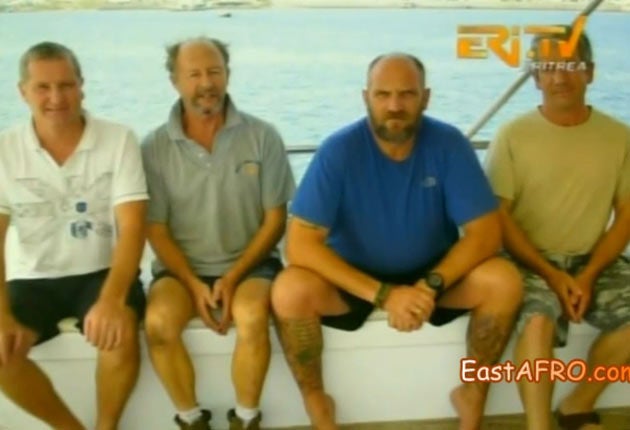Security firm offers apology in bid to free Britons held in Eritrea

Your support helps us to tell the story
From reproductive rights to climate change to Big Tech, The Independent is on the ground when the story is developing. Whether it's investigating the financials of Elon Musk's pro-Trump PAC or producing our latest documentary, 'The A Word', which shines a light on the American women fighting for reproductive rights, we know how important it is to parse out the facts from the messaging.
At such a critical moment in US history, we need reporters on the ground. Your donation allows us to keep sending journalists to speak to both sides of the story.
The Independent is trusted by Americans across the entire political spectrum. And unlike many other quality news outlets, we choose not to lock Americans out of our reporting and analysis with paywalls. We believe quality journalism should be available to everyone, paid for by those who can afford it.
Your support makes all the difference.A security firm whose bungled mission in the Horn of Africa led to four British men being captured in Eritrea, and held without consular access for more than six months, has issued an unreserved apology in an attempt to hasten their release.
The men, two of whom are former Royal Marines, disappeared on Christmas Eve hours after their ship was intercepted by the Eritrean navy after an unscheduled stop at a port in Massawa. They were sent back to the mainland and put in jail. All were contractors working for the Hatfield-based security firm Protection Vessels International (PVI).
Yesterday the company said it “deeply regretted” the situation, issuing “an unreserved apology for any wrongdoing”. Eritrean television showed footage of the four men being paraded as well as shots of arms and equipment including rifles, handguns, GPS devices, bullet-proof vests, and satellite phones seized from the vessel.
The incident occurred on 23 December after the Sea Scorpion, one of the PVI ships on assignment in the Horn of Africa, suffered an equipment failure and was instructed to approach Massawa in an attempt to refuel.
Equipped with weapon systems including sniper rifles, the boat is understood to have stopped at the offshore island of Romia, where some of its contents and personnel were unloaded. The ship was intercepted as it tried to leave Massawa, and the men – three of whom are named as Adrian Troy, Christopher Alan Collison and Alun Sims – were taken away.
The quartet are at the centre of an growing rift between Eritrea and Britain, which is urgently seeking diplomatic access. Last month the Foreign Office took the unprecedented step of stopping Eritrean diplomats from leaving London without permission. Sources in Asmara say requests for British consular access to the group have been denied by authorities; diplomatic discussions continue in New York, Brussels, Khartoum, Tripoli, Nairobi and Beijing.
Last night a spokesman for PVI told The Independent: “We are an armed maritime security firm for which carrying weapons for protective purposes is part of our client remit. It was not our intention to engage in a hostile confrontation with Eritrea and we apologise unreservedly if that was the way things were perceived. We deeply regret that and will apologise to the Eritrean government as well as take every step necessary to secure the release.”
The company added that all the staff had remained on its payroll and that their families would receive care.
An FCO spokesman said: “Attempts to engage in dialogue on the matter, including by the Foreign Secretary, have been rejected. We have now begun to implement a series of measures in response to the Eritrean government’s denial of consular access. We have a range of additional measures and will take further steps as necessary.”
Founded in 2008, PVI accounts for more than 40 per cent of all armed escort vessels operating in the Gulf of Aden, East Africa, and the Indian Ocean. Around 23,000 vessels pass through the Gulf of Aden each year, with 10 per cent of ships now using armed guards, a figure that is rising exponentially in wake of the piracy threat. Estimates for fees are considered as high as $1,200 daily for each operative.
But the rising threat of piracy is also behind an explosion of smaller and less regulated maritime security firms offering armed escort through dangerous waters. Last month the Security Association for the Maritime Industry (SAMI) launched in London in a bid to clamp down on smaller suppliers offering armed services. "We have got to dispel the market in which guys can be just thrown out to sea with a polo shirt, a mobile phone and a clutch of AK47s," said Steven Jones, its co-founder. "For every ex-royal marine with a distinguished service record, there are many that are simply there for the money to be made.
"In its worst case scenario, certain unscrupulous suppliers can have a worse track history than the pirates that they're employed to protect against."
Who are PVI?
Protection Vessels International is a maritime security company that provides about 50 armed escorts per month. One of the world's leaders in private maritime security, it accounts for more than 40 per cent of all armed-escort vessels operating in the Gulf of Aden, East Africa and the Indian Ocean.
The company was founded in 2008 by Dom Mee, a former Royal Marine, who served terms in Northern Ireland and Iraq during the first Gulf War. He later joined the UK Special Forces, where he specialised in intelligence for four years. PVI is based in Tiverton, Devon and in Hatfield, Hertfordshire.
Join our commenting forum
Join thought-provoking conversations, follow other Independent readers and see their replies
Comments